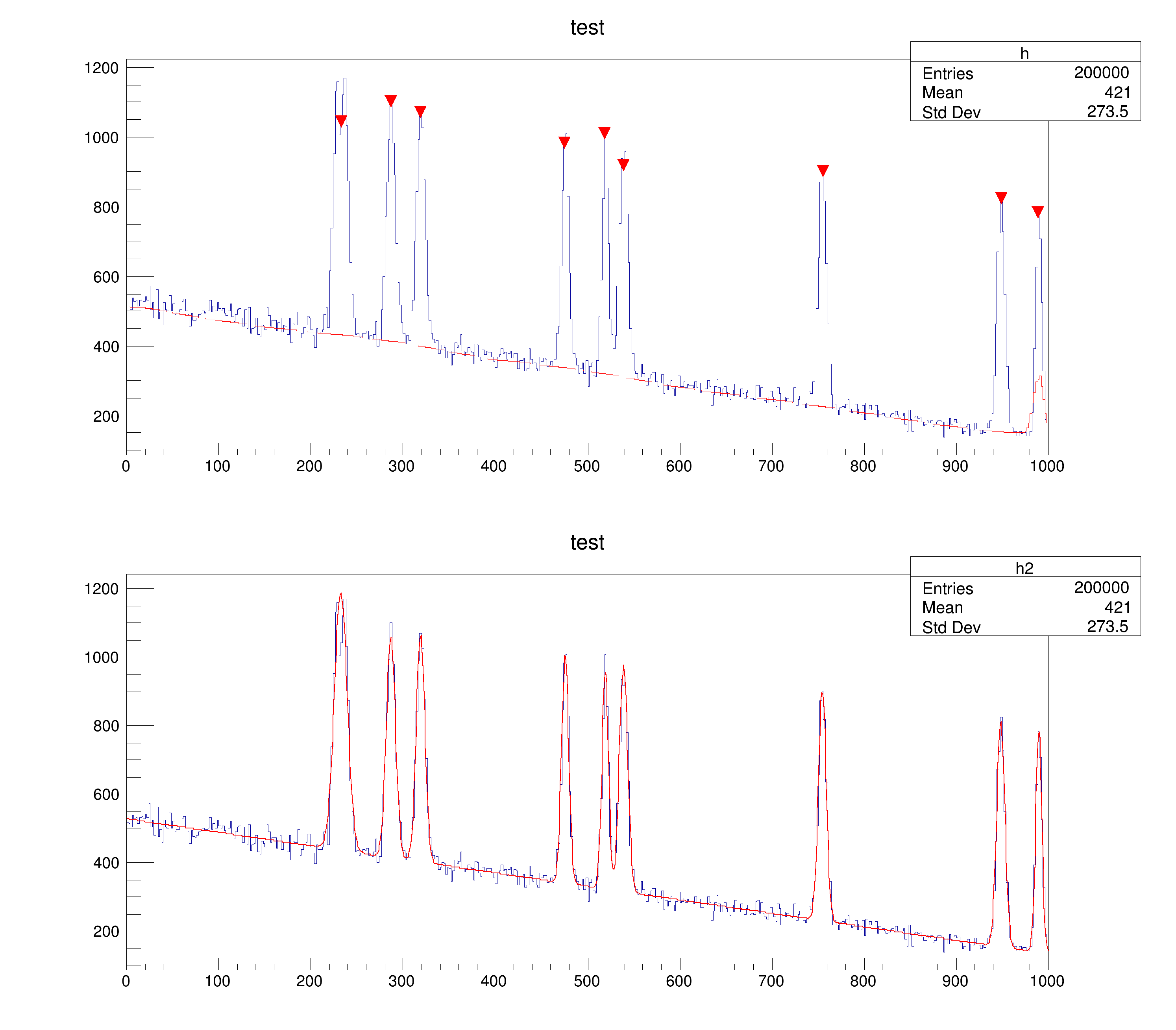This script generates a random number of gaussian peaks on top of a linear background. The position of the peaks is found via TSpectrum and injected as initial values of parameters to make a global fit. The background is computed and drawn on top of the original histogram.
This script can fit "peaks' heights" or "peaks' areas" (comment out or uncomment the line which defines __PEAKS_C_FIT_AREAS__).
To execute only the first part of the script (without fitting) specify a negative value for the number of peaks, eg
Found 9 candidate peaks to fit
Found 9 useful peaks to fit
Now fitting: Be patient
FCN=596.686 FROM MIGRAD STATUS=CONVERGED 1343 CALLS 1344 TOTAL
EDM=3.92392e-07 STRATEGY= 1 ERROR MATRIX UNCERTAINTY 4.1 per cent
EXT PARAMETER STEP FIRST
NO. NAME VALUE ERROR SIZE DERIVATIVE
1 p0 5.27684e+02 2.01895e+00 1.61337e-04 1.75611e-05
2 p1 -3.95030e-01 3.04733e-03 -2.24976e-07 9.00273e-03
3 p2 6.34691e+02 2.03922e+01 6.11343e-03 8.34700e-06
4 p3 5.19331e+02 9.71873e-02 -3.36434e-05 5.32034e-03
5 p4 3.49850e+00 1.08256e-01 -2.36209e-05 1.49297e-03
6 p5 6.64734e+02 1.64194e+01 -1.21344e-03 3.63148e-06
7 p6 3.19147e+02 1.05478e-01 7.08426e-06 2.00939e-04
8 p7 4.69148e+00 9.07160e-02 1.69389e-06 -1.62399e-03
9 p8 6.70930e+02 1.64206e+01 3.50063e-03 -9.49091e-06
10 p9 7.54806e+02 9.99565e-02 1.99123e-05 -2.47890e-03
11 p10 4.29726e+00 7.99677e-02 -3.50356e-05 -3.01094e-03
12 p11 6.69618e+02 1.73089e+01 -7.16995e-03 1.61496e-05
13 p12 4.75964e+02 9.46541e-02 -1.85498e-05 -6.93464e-04
14 p13 3.89327e+00 8.40808e-02 2.51847e-05 -4.75462e-03
15 p14 6.48094e+02 1.48388e+01 1.51648e-02 1.40873e-05
16 p15 9.89666e+02 7.93960e-02 2.05426e-08 5.80091e-03
17 p16 3.34529e+00 5.62112e-02 6.45922e-06 6.69573e-03
18 p17 6.62565e+02 1.83711e+01 9.37344e-03 1.71791e-05
19 p18 5.39268e+02 1.17175e-01 -4.07242e-05 2.90506e-04
20 p19 4.56057e+00 9.79810e-02 -3.17654e-05 1.67849e-03
21 p20 6.59405e+02 1.56865e+01 -5.02844e-03 1.33136e-05
22 p21 9.48476e+02 1.01997e-01 -2.38534e-05 -2.87561e-03
23 p22 4.41169e+00 8.80653e-02 3.30904e-05 -1.55483e-04
24 p23 7.53519e+02 1.46208e+01 -1.21918e-03 -1.58005e-05
25 p24 2.32585e+02 1.49583e-01 4.30086e-05 2.06782e-03
26 p25 6.95026e+00 1.18485e-01 1.79213e-05 3.79338e-04
27 p26 6.45490e+02 1.58541e+01 5.23845e-03 8.39699e-06
28 p27 2.86948e+02 1.20789e-01 7.08536e-05 -1.98488e-04
29 p28 4.98698e+00 9.92605e-02 -3.61574e-05 3.47101e-03
for (
Int_t p=0;p<npeaks;p++) {
#if defined(__PEAKS_C_FIT_AREAS__)
#endif
}
return result;
}
void peaks(
Int_t np=10) {
par[0] = 0.8;
par[1] = -0.6/1000;
for (p=0;p<npeaks;p++) {
par[3*p+2] = 1;
#if defined(__PEAKS_C_FIT_AREAS__)
#endif
}
TF1 *
f =
new TF1(
"f",fpeaks,0,1000,2+3*npeaks);
h->FillRandom(
"f",200000);
Int_t nfound =
s->Search(
h,2,
"",0.10);
printf("Found %d candidate peaks to fit\n",nfound);
TH1 *hb =
s->Background(
h,20,
"same");
if (np <0) return;
TF1 *fline =
new TF1(
"fline",
"pol1",0,1000);
npeaks = 0;
xpeaks =
s->GetPositionX();
for (p=0;p<nfound;p++) {
Int_t bin =
h->GetXaxis()->FindBin(xp);
par[3*npeaks+2] = yp;
par[3*npeaks+3] = xp;
par[3*npeaks+4] = 3;
#if defined(__PEAKS_C_FIT_AREAS__)
#endif
npeaks++;
}
printf("Found %d useful peaks to fit\n",npeaks);
printf("Now fitting: Be patient\n");
TF1 *fit =
new TF1(
"fit",fpeaks,0,1000,2+3*npeaks);
}
R__EXTERN TRandom * gRandom
virtual void SetNpx(Int_t npx=100)
Set the number of points used to draw the function.
virtual void SetParameters(const Double_t *params)
virtual Double_t Eval(Double_t x, Double_t y=0, Double_t z=0, Double_t t=0) const
Evaluate this function.
virtual Double_t GetParameter(Int_t ipar) const
1-D histogram with a float per channel (see TH1 documentation)}
virtual TFitResultPtr Fit(const char *formula, Option_t *option="", Option_t *goption="", Double_t xmin=0, Double_t xmax=0)
Fit histogram with function fname.
virtual Double_t Rndm()
Machine independent random number generator.
Advanced Spectra Processing.
static TVirtualFitter * Fitter(TObject *obj, Int_t maxpar=25)
Static function returning a pointer to the current fitter.
static constexpr double s
Double_t Gaus(Double_t x, Double_t mean=0, Double_t sigma=1, Bool_t norm=kFALSE)
Calculate a gaussian function with mean and sigma.
Double_t Sqrt(Double_t x)
constexpr Double_t TwoPi()



 Illustrates how to find peaks in histograms.
Illustrates how to find peaks in histograms. 